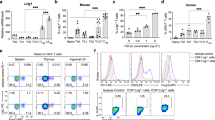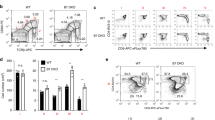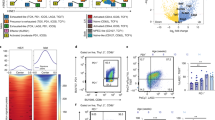Abstract
Although T helper (TH) cell–mediated immunity is required to effectively eliminate pathogens, unrestrained TH activity also contributes to tissue injury in many inflammatory and autoimmune diseases. We report here that the TH type 1 (TH1)-specific Tim-3 (T cell immunoglobulin domain, mucin domain) protein functions to inhibit aggressive TH1-mediated auto- and alloimmune responses. Tim-3 pathway blockade accelerated diabetes in nonobese diabetic mice and prevented acquisition of transplantation tolerance induced by costimulation blockade. These effects were mediated, at least in part, by dampening of the antigen-specific immunosuppressive function of CD4+CD25+ regulatory T cell populations. Our data indicate that the Tim-3 pathway provides an important mechanism to down-regulate TH1-dependent immune responses and to facilitate the development of immunological tolerance.
This is a preview of subscription content, access via your institution
Access options
Subscribe to this journal
Receive 12 print issues and online access
$209.00 per year
only $17.42 per issue
Buy this article
- Purchase on Springer Link
- Instant access to full article PDF
Prices may be subject to local taxes which are calculated during checkout





Similar content being viewed by others
References
Romagnani, S. Lymphokine production by human T cells in disease states. Annu. Rev. Immunol. 12, 227–257 (1994).
Kamradt, T. & Mitchison, N.A. Tolerance and autoimmunity. N. Engl. J. Med. 344, 655–664 (2001).
Strom, T.B. et al. The Th1/Th2 paradigm and the allograft response. Curr. Opin. Immunol. 8, 688–693 (1996).
Li, X.C., Zand, M.S., Li, Y., Zheng, X.X. & Strom, T.B. On histocompatibility barriers, Th1 to Th2 immune deviation, and the nature of the allograft responses. J. Immunol. 161, 2241–2247 (1998).
Anderson, G.P. & Coyle, A.J. TH2 and 'TH2-like' cells in allergy and asthma: pharmacological perspectives. Trends. Pharmacol. Sci. 15, 324–332 (1994).
Kundig, T.M. et al. Duration of TCR stimulation determines costimulatory requirement of T cells. Immunity 5, 41–52 (1996).
Locksley, R.M., Killeen, N. & Lenardo, M.J. The TNF and TNF receptor superfamilies: integrating mammalian biology. Cell 104, 487–501 (2001).
Salomon, B. & Bluestone, J.A. Complexities of CD28/B7: CTLA-4 costimulatory pathways in autoimmunity and transplantation. Annu. Rev. Immunol. 19, 225–252 (2001).
Refaeli, Y., Van Parijs, L., London, C.A., Tschopp, J. & Abbas, A.K. Biochemical mechanisms of IL-2-regulated Fas-mediated T cell apoptosis. Immunity 8, 615–623 (1998).
Monney, L. et al. Th1-specific cell surface protein Tim-3 regulates macrophage activation and severity of an autoimmune disease. Nature 415, 536–541 (2002).
Parker, D.C. et al. Survival of mouse pancreatic islet allografts in recipients treated with allogeneic small lymphocytes and antibody to CD40 ligand. Proc. Natl. Acad. Sci. USA 92, 9560–9564 (1995).
Sanchez-Fueyo, A., Weber, M., Domenig, C., Strom, T.B. & Zheng, X.X. Tracking the immunoregulatory mechanisms active during allograft tolerance. J. Immunol. 168, 2274–2281 (2002).
Quezada, S.A. et al. Mechanisms of donor specific transfusion tolerance: pre-emptive induction of clonal T cell exhaustion via indirect presentation. Blood 1920–1926 (2003).
Coyle, A.J. et al. The CD28-related molecule ICOS is required for effective T cell-dependent immune responses. Immunity 13, 95–105 (2000).
Wells, A.D., Gudmundsdottir, H. & Turka, L.A. Following the fate of individual T cells throughout activation and clonal expansion. Signals from T cell receptor and CD28 differentially regulate the induction and duration of a proliferative response. J. Clin. Invest. 100, 3173–3183 (1997).
Sabatos, C.A. et al. Tim-3/Tim-3-Ligand interaction regulates TH1 responses and induction of peripheral tolerance. Nat. Immunol. advance online publication 12 October 2003; doi:10.1038/ni988.
Delovitch, T.L. & Singh, B. The nonobese diabetic mouse as a model of autoimmune diabetes: immune dysregulation gets the NOD. Immunity 7, 727–738 (1997).
Christianson, S.W., Shultz, L.D. & Leiter, E.H. Adoptive transfer of diabetes into immunodeficient NOD-scid/scid mice. Relative contributions of CD4+ and CD8+ T-cells from diabetic versus prediabetic NOD.NON-Thy-1a donors. Diabetes 42, 44–55 (1993).
McIntire, J.J. et al. Identification of Tapr (an airway hyperreactivity regulatory locus) and the linked Tim gene family. Nat. Immunol. 2, 1109–1116 (2001).
Kuchroo, V.K., Umetsu, D.T., DeKruyff, R.H. & Freeman, G.J. The TIM gene family: emerging roles in immunity and disease. Nat. Rev. Immunol. 3, 454–462 (2003).
Li, X.C. et al. IL-2 and IL-4 double knockout mice reject islet allografts: a role for novel T cell growth factors in allograft rejection. J. Immunol. 161, 890–896 (1998).
Kishimoto, K. et al. The role of CD154-CD40 versus CD28-B7 costimulatory pathways in regulating allogeneic Th1 and Th2 responses in vivo. J. Clin. Invest. 106, 63–72 (2000).
Sho, M. et al. Physiological mechanisms of regulating alloimmunity: cytokines, CTLA-4, CD25+ cells, and the alloreactive T cell clone size. J. Immunol. 169, 3744–3751 (2002).
Zheng, X.X. et al. CTLA4 signals are required to optimally induce allograft tolerance with combined donor-specific transfusion and anti-CD154 monoclonal antibody treatment. J. Immunol. 162, 4983–4990 (1999).
DeKruyff, R.H., Fang, Y. & Umetsu, D.T. IL-4 synthesis by in vivo primed keyhole limpet hemocyanin specific CD4+ T cells. I. Influence of antigen concentration and antigen presenting cell type. J. Immunol. 149, 3468–3476 (1992).
Judge, T.A. et al. The in vivo mechanism of action of CTLA4Ig. J. Immunol. 156, 2294–2299 (1996).
Waaga, A.M. et al. Regulatory functions of self-restricted MHC class II allopeptide-specific Th2 clones in vivo. J. Clin. Invest. 107, 909–916 (2001).
Lee, R.S. et al. CTLA4Ig-induced linked regulation of allogeneic T cell responses. J. Immunol. 166, 1572–1582 (2001).
Maurik Av, A., Herber, M., Wood, K.J. & Jones, N.D. Cutting edge: CD4+CD25+ alloantigen-specific immunoregulatory cells that can prevent CD8+ T cell-mediated graft rejection: implications for anti-CD154 immunotherapy. J. Immunol. 169, 5401–5404 (2002).
Kingsley, C.I., Karim, M., Bushell, A.R. & Wood, K.J. CD25+CD4+ regulatory T cells prevent graft rejection: CTLA-4- and IL-10- dependent immunoregulation of alloresponses. J. Immunol. 168, 1080–1086 (2002).
Graca, L. et al. Both CD4+CD25+ and CD4+CD25− regulatory cells mediate dominant transplantation tolerance. J. Immunol. 168, 5558–5565 (2002).
Sakaguchi, S. & Sakaguchi, N. Thymus and autoimmunity: capacity of the normal thymus to produce pathogenic self-reactive T cells and conditions required for their induction of autoimmune disease. J. Exp. Med. 172, 537–545 (1990).
Sakaguchi, S., Sakaguchi, N., Asano, M., Itoh, M. & Toda, M. Immunologic self-tolerance maintained by activated T cells expressing IL-2 receptor α-chains (CD25). Breakdown of a single mechanism of self-tolerance causes various autoimmune diseases. J. Immunol. 155, 1151–1164 (1995).
Salomon, B. et al. B7/CD28 costimulation is essential for the homeostasis of the CD4+CD25+ immunoregulatory T cells that control autoimmune diabetes. Immunity 12, 431–440 (2000).
Wood, K.J. & Sakaguchi, S. Regulatory lymphocytes: regulatory T cells in transplantation tolerance. Nat. Rev. Immunol. 3, 199–210 (2003).
Shevach, E.M. CD4+CD25+ suppressor T cells: more questions than answers. Nat. Rev. Immunol. 2, 389–400 (2002).
Caramalho, I. et al. Regulatory T cells selectively express Toll-like receptors and are activated by lipopolysaccharide. J. Exp. Med. 197, 403–411 (2003).
Pasare, C. & Medzhitov, R. Toll pathway-dependent blockade of CD4+CD25+ T cell-mediated suppression by dendritic cells. Science 299, 1033–1036 (2003).
Iwakoshi, N.N. et al. Treatment of allograft recipients with donor-specific transfusion and anti-CD154 antibody leads to deletion of alloreactive CD8+ T cells and prolonged graft survival in a CTLA4-dependent manner. J. Immunol. 164, 512–521 (2000).
Yamazaki, S. et al. Direct expansion of functional CD25+CD4+ regulatory T cells by antigen-processing dendritic cells. J. Exp. Med. 198, 235–247 (2003).
Walker, L.S., Chodos, A., Eggena, M., Dooms, H. & Abbas, A.K. Antigen-dependent proliferation of CD4+CD25+ regulatory T cells in vivo. J. Exp. Med. 198, 249–258 (2003).
Buhlmann, J.E. et al. In the absence of a CD40 signal, B cells are tolerogenic. Immunity 2, 645–653 (1995).
Foy, T.M., Aruffo, A., Bajorath, J., Buhlmann, J.E. & Noelle, R.J. Immune regulation by CD40 and its ligand GP39. Annu. Rev. Immunol. 14, 591–617 (1996).
Hollander, G.A. et al. Induction of alloantigen-specific tolerance by B cells from CD40-deficient mice. Proc. Natl. Acad. Sci. USA 93, 4994–4998 (1996).
Martin, E., O'Sullivan, B., Low, P. & Thomas, R. Antigen-specific suppression of a primed immune response by dendritic cells mediated by regulatory T cells secreting interleukin-10. Immunity 18, 155–167 (2003).
Yoon, J.W. et al. Control of autoimmune diabetes in NOD mice by GAD expression or suppression in beta cells. Science 284, 1183–1187 (1999).
Steiger, J., Nickerson, P.W., Steurer, W., Moscovitch-Lopatin, M. & Strom, T.B. IL-2 knockout recipient mice reject islet cell allografts. J. Immunol. 155, 489–498 (1995).
Li, Y. et al. Blocking both signal 1 and signal 2 of T-cell activation prevents apoptosis of alloreactive T cells and induction of peripheral allograft tolerance. Nat. Med. 5, 1298–1302 (1999).
Acknowledgements
We thank Chimerigen (Allston, Massachusetts) for providing purified fusion proteins, and Y. Tian for technical assistance. Supported by the Juvenile Diabetes Research Foundation (X.X.Z. and A.S.-F.), the National Institute of Allergy and Infectious Diseases (T.B.S.) and the Juvenile Diabetes Research Foundation Center for Islet Transplantation at Harvard Medical School (T.B.S.).
Author information
Authors and Affiliations
Corresponding authors
Ethics declarations
Competing interests
J.T., D.P., J.-C.G.-R. and A.J.C. are employed by Millennium Pharmaceuticals, which holds the patent on Tim-3, as does V.K.K.
Rights and permissions
About this article
Cite this article
Sánchez-Fueyo, A., Tian, J., Picarella, D. et al. Tim-3 inhibits T helper type 1–mediated auto- and alloimmune responses and promotes immunological tolerance. Nat Immunol 4, 1093–1101 (2003). https://doi.org/10.1038/ni987
Received:
Accepted:
Published:
Issue Date:
DOI: https://doi.org/10.1038/ni987
This article is cited by
-
Effect of Cyclosporine A on Th1/Th2 Cytokine Production by Decidual Stromal Cells Mediated by Trophoblast-derived Galectin-9
Reproductive Sciences (2024)
-
Advances in immune checkpoint-based immunotherapies for multiple sclerosis: rationale and practice
Cell Communication and Signaling (2023)
-
Peripheral PD-1 and Tim-3 percentages are associated with primary sites and pathological types of peritoneal neoplasms
BMC Cancer (2023)
-
Targeting LAG-3, TIM-3, and TIGIT for cancer immunotherapy
Journal of Hematology & Oncology (2023)
-
Role of Tim-3 in COVID-19: a potential biomarker and therapeutic target
Archives of Virology (2023)



